On the day I joined world-record holder Sarah Ferguson for day four of a seven-day ocean swim along KwaZulu-Natal’s North Coast, the Durban Weather Bureau issued a warning: gale-force winds and rough seas. The trees bent with the strain. The sea frothed, white horses galloped in all directions. Blythedale beach was deserted, not a single fisherman in sight.
Stray cats foraged in the litter in the carpark. A group of Philocaly Trail walkers, setting off on another leg of a 140km coastal walk from Durban to Mtunzini, picked up the rubbish.
Philocaly is ancient Greek for “love of beauty”. The word is tattooed upon the upper torso of Nikki Williamson — a 41-year-old finance recruiter who organised the event.
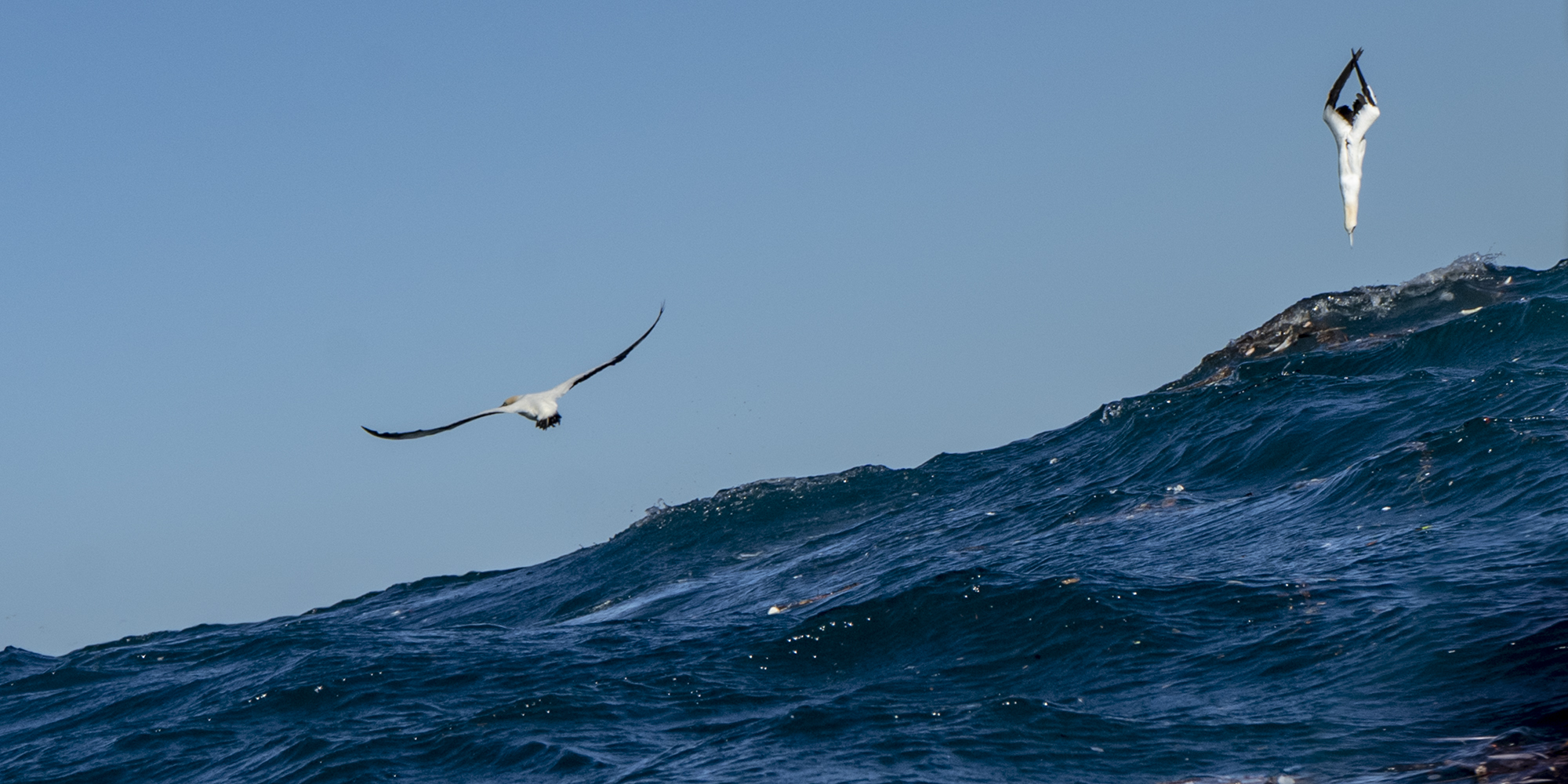 Gannets, which can hit the water at more than 100km/h in a dive, are seriously affected by plastic pollution when feeding. The record for the most amount of plastic found in a 90-day-old gannet chick is 276 pieces. (Photo: Linda Ness / View more: @linda.ness.pix)
Gannets, which can hit the water at more than 100km/h in a dive, are seriously affected by plastic pollution when feeding. The record for the most amount of plastic found in a 90-day-old gannet chick is 276 pieces. (Photo: Linda Ness / View more: @linda.ness.pix)
In addition to raising funds for ocean conservation, the trail creates awareness about the decisions we make, “particularly for people who have children who right now have a pretty grim outlook on what may happen if we don’t start doing more to protect our oceans”, said Williamson.
“We are on one of the most significant coastlines in the world, and are not exploring it. I want to appeal to the adventurer and the explorer to join these trails. The more we appreciate nature, the more we protect it,” said Williamson.
While other participants walked, Ferguson took to the sea, accompanied by her coach, Sarah Houston, a team of support and safety swimmers and a photography crew on board a boat on the lookout for sharks whose numbers are rapidly dwindling.
Conservationists believe the drop in shark numbers is largely due to the use of nets and baited drum lines to fish out resident shark populations along 320km of coastline. These measures come at a high cost to ocean biodiversity. The KwaZulu-Natal Sharks’ Board estimates that about 550 sharks are killed on the KwaZulu-Natal coast each year, along with turtles, dolphins and whales.
The nets and drum lines are essentially fishing devices, designed to keep shark numbers down so that bathers are protected.
And worldwide, according to WildOceans, the number of sharks killed each year due to overfishing is estimated to be 100 million — with many species even more threatened than the rhino. Often only the fin is used and the rest of the shark discarded.
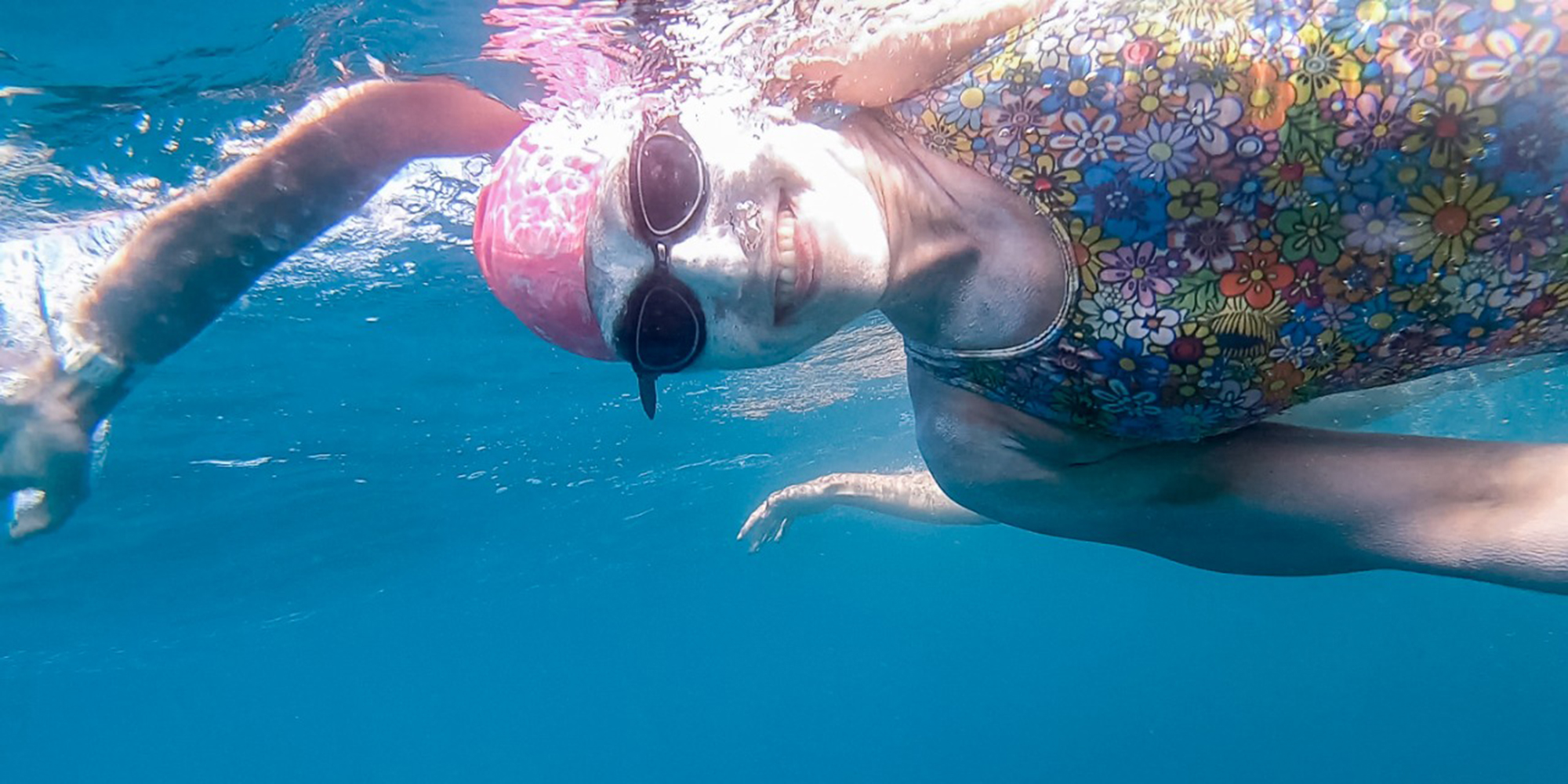 Sarah Ferguson completed the non-stop 63.5km swim around the volcanic island in 19 hours and eight minutes. (Photo: Woftywild)
Sarah Ferguson completed the non-stop 63.5km swim around the volcanic island in 19 hours and eight minutes. (Photo: Woftywild)
Like many ocean adventurers, John McCarthy, a world-renowned surfer, free-diver and lead member of Ferguson’s safety team, reckons shark nets and drum lines should be done away with.
In an open letter last year, he wrote:
“What if sharks are not really interested in us as prey? Daily we swim with all species of sharks at Aliwal Shoal, Sodwana and in Mozambique. They show nothing more than a passing interest in us. At Muizenberg in Cape Town, where there are no nets, thousands of people enter the water every week. If sharks really were interested in humans there would be no surfers left!”
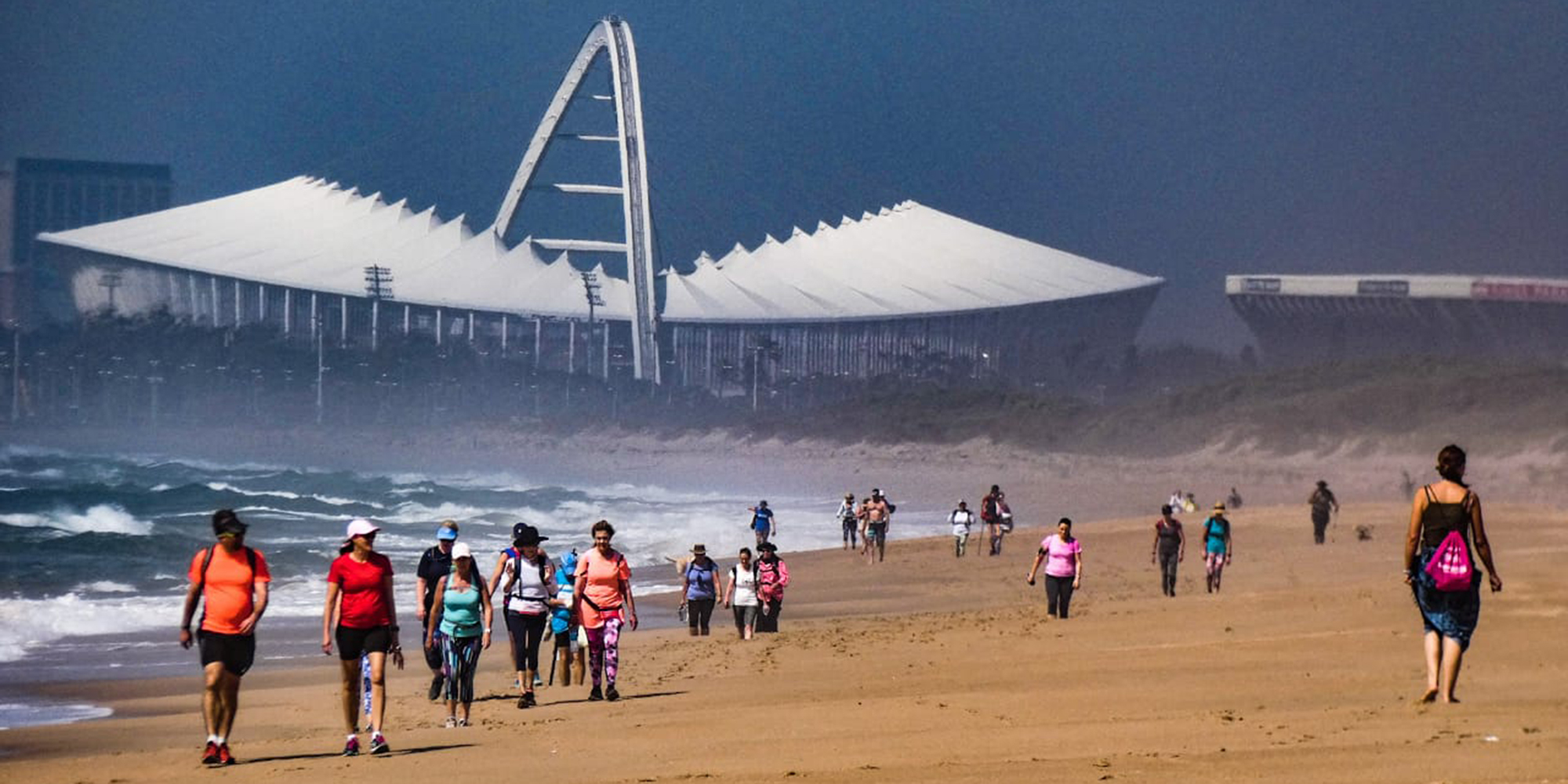 More than 140 people took part in the first Philocaly Trail — a 140km coastal walk from Durban to Mtunzini in aid of ocean conservation. The Philocaly trails encourage people to explore spectacular stretches of South Africa’s coastline. (Photo: Linda Ness / View more: @linda.ness.pix)
More than 140 people took part in the first Philocaly Trail — a 140km coastal walk from Durban to Mtunzini in aid of ocean conservation. The Philocaly trails encourage people to explore spectacular stretches of South Africa’s coastline. (Photo: Linda Ness / View more: @linda.ness.pix)
“What if the nets along our beaches have just been one huge mistake — an environmental crime that has seen close to 50,000 marine animals lose their lives unnecessarily, perpetuated in the misinformed guise of bather protection? … That’s an awkward thought, isn’t it?”
While Ferguson shares McCarthy’s views, her primary concern is plastic pollution. She is the founder of Breathe Ocean Conservation which encourages people “to respond in the moment, where you can, to stop plastic pollution — no matter how small the effort may seem”.
She takes on hugely adventurous feats to spread this message.
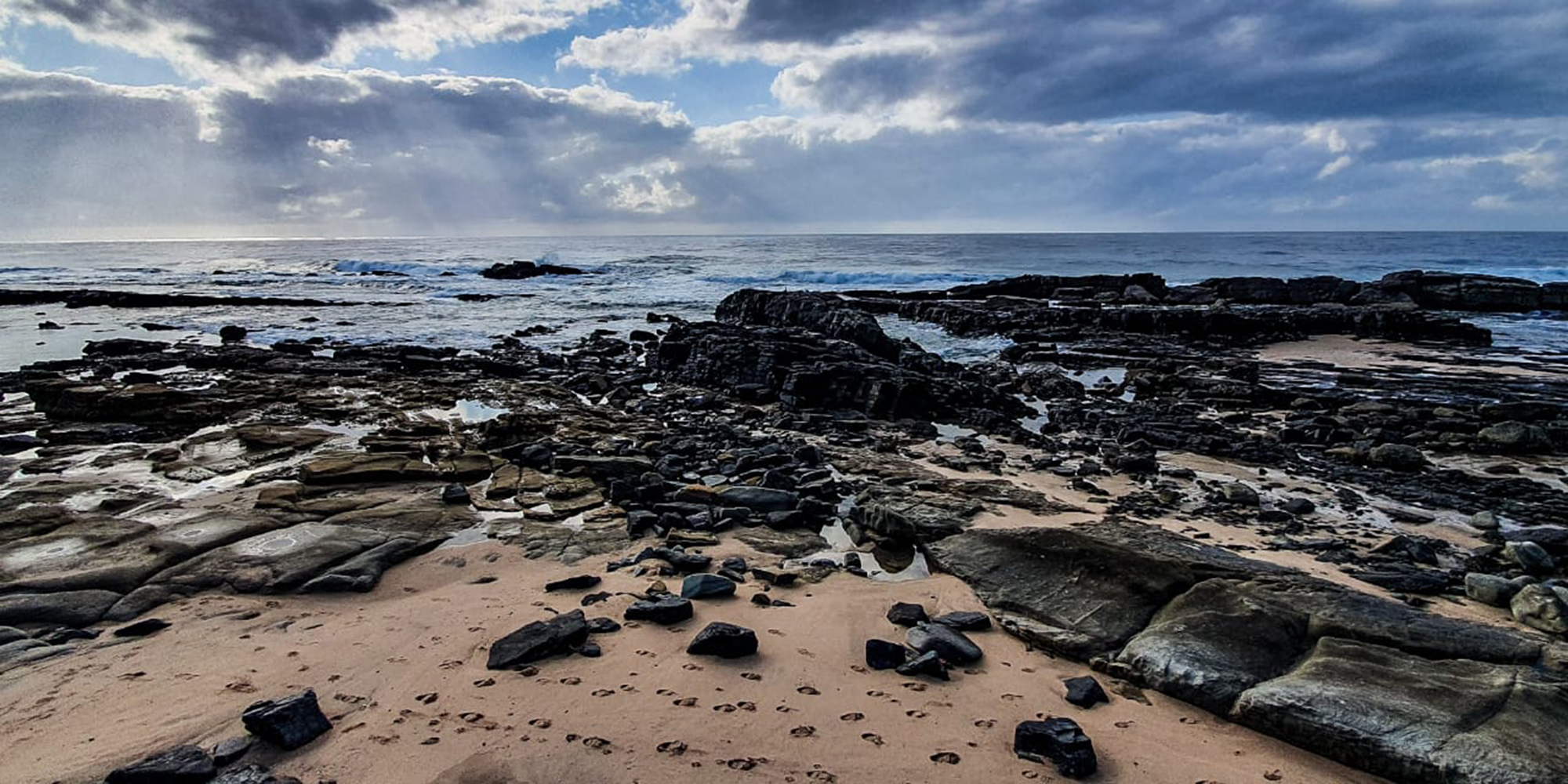 Sheffield Beach near Ballito, part of the first Philocaly Trail. (Photo: Courtesy of Ant Williamson photography)
Sheffield Beach near Ballito, part of the first Philocaly Trail. (Photo: Courtesy of Ant Williamson photography)
In March, Ferguson became the first person to swim around Chile’s Easter island — a UNESCO World Heritage site famed for its archaeological sites, including nearly 900 monumental statues (moai). The last person who tried to get all the way round gave up after 26 hours.
Natively known as Rapa Nui, the volcanic island is one of the most remote inhabited locations in the world. Yet it is in peril at the hands of plastic pollution amid massive tourism growth and associated waste management challenges.
 Tinley Manor tidal pool, part of the first Philocaly Trail. (Photo: Courtesy of Ant Williamson photography)
Tinley Manor tidal pool, part of the first Philocaly Trail. (Photo: Courtesy of Ant Williamson photography)
Finless, Ferguson completed the non-stop 63.5km (40-mile) swim around the volcanic island in 19 hours and eight minutes. She wasn’t allowed to touch the boat. Every 30 minutes, her crew threw her more fuel — a cup of tea and a banana, or a cheese sandwich, maybe some soup when it got cold.
In 2017, Ferguson became the first African woman to swim the Kai’wi channel between the Hawaiian islands of Oahu and Molokai. This took her 18 hours. Following that was a 100km stage swim from Mozambique to Sodwana in northern Kwazulu-Natal. This took six days.
Then, earlier in 2019, Ferguson and fellow ocean lover and photographer Linda Ness followed the sardine run off South Africa’s Wild Coast — an extraordinary annual phenomenon that sees thousands of ocean predators — from game fish and seals through to huge pods of dolphins and vast packs of sharks — embark on a feeding frenzy on billions of sardines as they migrate up the East Coast.
The Sardine Run emanates from the cold waters off Agulhas Bank in the Cape — home to a vast biomass of sardines which thrive in temperatures below 21ºC. In winter months, a thin band of cold water occurs along the East Coast, enabling sardines to migrate to spawn up north. In KwaZulu-Natal, this band of cold water forms an even narrower tongue close to shore, giving rise to spectacular sardine runs.
“Somehow, Sarah and I ended up travelling up the eddy line between the two currents,” said Ness.
“Everything that floats and nearly-floats gets caught up here. We found ourselves swimming through human trash in a line as far as you could see. It was like being in a giant petri dish surrounded by a swill of slow-motion amoebas, only it was bottles and bits of bag, and rope and packaging,” said Ness.
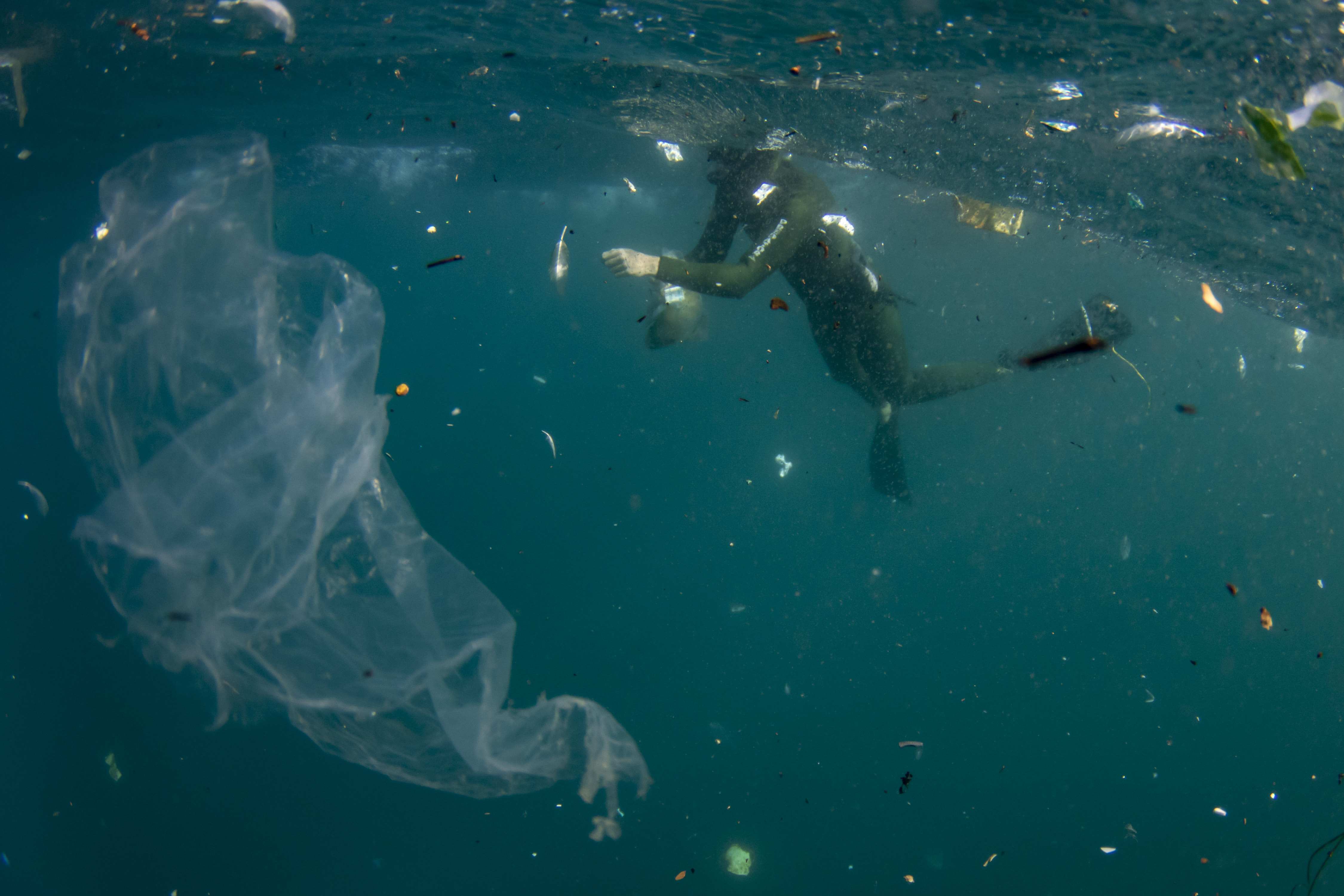 World-renowned open-water swimmer and founder of Breathe Ocean Conservation, Sarah Ferguson, described the experience as ‘like being in a giant petri dish surrounded by a swill of slow-motion amoebas, only it was bottles and bits of bag, and rope and packaging’. (Photo: Linda Ness / View more: @linda.ness.pix)
World-renowned open-water swimmer and founder of Breathe Ocean Conservation, Sarah Ferguson, described the experience as ‘like being in a giant petri dish surrounded by a swill of slow-motion amoebas, only it was bottles and bits of bag, and rope and packaging’. (Photo: Linda Ness / View more: @linda.ness.pix)
“As I focused through the viewfinder of my camera, feathers and creepy stuff would float by, getting caught in my hair,” recalled Ness. “It was horrifying to watch and difficult to find a place for it in my head. I’ve been looking at beautiful sea-things all my life. It flicked switches for me.”
Gannets are remarkable birds, hitting the water at more than 100km/hr in a missile dive.
They have airbags between skull and skin to cushion the impact and special muscles to stiffen their necks.
“But even with all the adaptations the missile dive is dangerous,” said Ness. “Add a submerged plastic bottle or bag to smash into, it’s just shifting the odds of survival. I wanted to look away, but this time I decided to look at it properly. With my camera.”
Ferguson was equally freaked. “I felt like I had been punched in the stomach,” said Ferguson. “I get emotional every time I tell the story. My resolve grew. To swim harder and faster and to try and tell the world to protect the ocean.”
According to PlasticOceans, every year eight million tons of plastic is dumped into the sea. The record for most plastic found in a 90-day-old gannet chick is 276 pieces. If there is plastic inside the seabirds and plastic inside the dolphins, there is plastic inside the food we eat. It is in the food chain.
Typically, Ferguson, who works as a physiotherapist and Pilates instructor, threw her support behind the launch of the Philocaly Trail alongside Houston, McCarthy and others on her safety team. I joined the crew on the day gale-force winds struck.
We launched off Blythedale beach in gigantic surf. Passing through the breakers, three crew members were thrown overboard. We re-gathered, pushed along the coast, riding five-metre swells, seeking out the two Sarahs. I wasn’t saying it, but I was thinking, this is not possible. No one can swim in this when it was difficult to even stay on board a boat.
But minutes later, out of the blue, a bright pink cap popped up, and then a white one.
Then they were gone again, engulfed. Then they were back. The swimmers’ faces, beaming and white with suncream, told a different story. They were whooping with joy.
There were times during the following five hours, when, overcome by the enormity of the project and the hugeness of the sea, I didn’t think we would make it. And there were times when Sarah had to dig deep to keep going. And that she did. Bluebottles and jellyfish are often what cause the most trouble on these swims and Sarah was stung badly by a bluebottle on her shoulder.
“At first, I welcomed the pain. I was getting tired and it was a distraction. But then it got bad and I needed to take an antihistamine.” And she did so with a laugh and a smile.
Also, on the boat, was Jess Escobar Porras, a marine biologist and shark expert, who was keen to observe how the earth’s oldest predators took to Sarah swimming through their North Coast territory.
“Chance encounters with sharks are special. They are incredible creatures. Without them the sea would die. And then we would die,” said Escobar.
“Seeing whales, dolphins, manta rays — even shoals of fish — is also truly magical”, said Ferguson, recounting highlights from previous swims.
“On the first day of the Mozambique swim I was so close to a manta ray I could have touched it. There were whales about 20m away. But the best time in the sea I’ve ever had was in Hawaii, not on the formal swim, but with a local snorkeller along the west coast. We were hanging out with turtles. There was this one particular turtle I swam with for ages, and I could have spent all day with him.”
“When I’m struggling with the swimming, even a quick visit from a bird helps me reset and gives me a second wind. Now and again you need a little help to push through the discomfort for a little longer and then either a new form of discomfort will set in — which is a welcome distraction — or you see a dolphin or a fish or a gannet. That’s what keeps me going. That’s what I love about the ocean. It is ever-changing and full of surprises.”
On the Kai’wi swim it was a tiger shark that briefly made an appearance and then disappeared.
“I knew he was there. It was so exciting!” she said.
“Our strategy with sharks is just to keep going,” said McCarthy. “Usually when we see a shark, two more swimmers jump in. We form a strong unit and don’t splash and flail around. We make sure we don’t fit into the programmed behaviour of what shark prey does. The sharks don’t bother us. And we don’t bother them.”
But on the latest swim on the North Coast which is usually abundant with life, the crew only spotted a hammerhead and common black tip shark, and at Princes Grant a drumline, a giant baited hook attached to a buoy.
“Two pods of dolphins came near us, but were not interested in hanging out. The whales were incredibly shy and did not hang around. This is very disappointing and potentially a cause for alarm,” said Ferguson in a post-swim interview.
She said the KwaZulu-Natal coast with its many reefs should be teeming with life and believes the apparent absence may be the result of overfishing, climate change and pollution.
“Our marine life and reefs are taking strain. We expected to see a whole lot more life than we did,” she said.
This has added more purpose to Ferguson’s cause. She is planning another marathon swim along South Africa’s Wild Coast, a pristine coastline threatened by heavy minerals mining and other associated developments.
“My motto is little by little, day by day. It is not always easy. I am tired. Training is inconvenient and not always fun. My body is always sore and I carry stupid little shoulder niggles from sheer exhaustion. During intense training times I limit my working hours to fewer patients a day, which means a massive financial knock. But I can’t not do it.”
“I get to my goal by doing it one stroke at a time. With the issue of plastic pollution, it’s one decision at a time. Every time you pick up a straw, or every time you refuse a straw, you’re making a difference.” DM — Additional reporting by Mlu Mdletshe and Fred Kockott
The Philocaly Trail started on 12 October, during National Marine Week, at uShaka Marine World beach, Durban. Over the course of 140km and seven days, a total of 280 hikers took part, collecting pollution on the beach and raising more than R60,000 for the three nonprofit organisations involved in marine conservation, Breath Conservation, Wild Oceans and KZN Beach Cleanup. Sarah Ferguson will give a talk about her latest adventure on 7 November at Lupa Osteria, in Durban North, KwaZulu-Natal.
This story was produced for Daily Maverick by www.rovingreporters.co.za
Jess Nicholson is a writer and copy editor based in Durban, South Africa. After years spent in the newsroom and designing and editing books, her focus is now on writing travel and human interest stories.




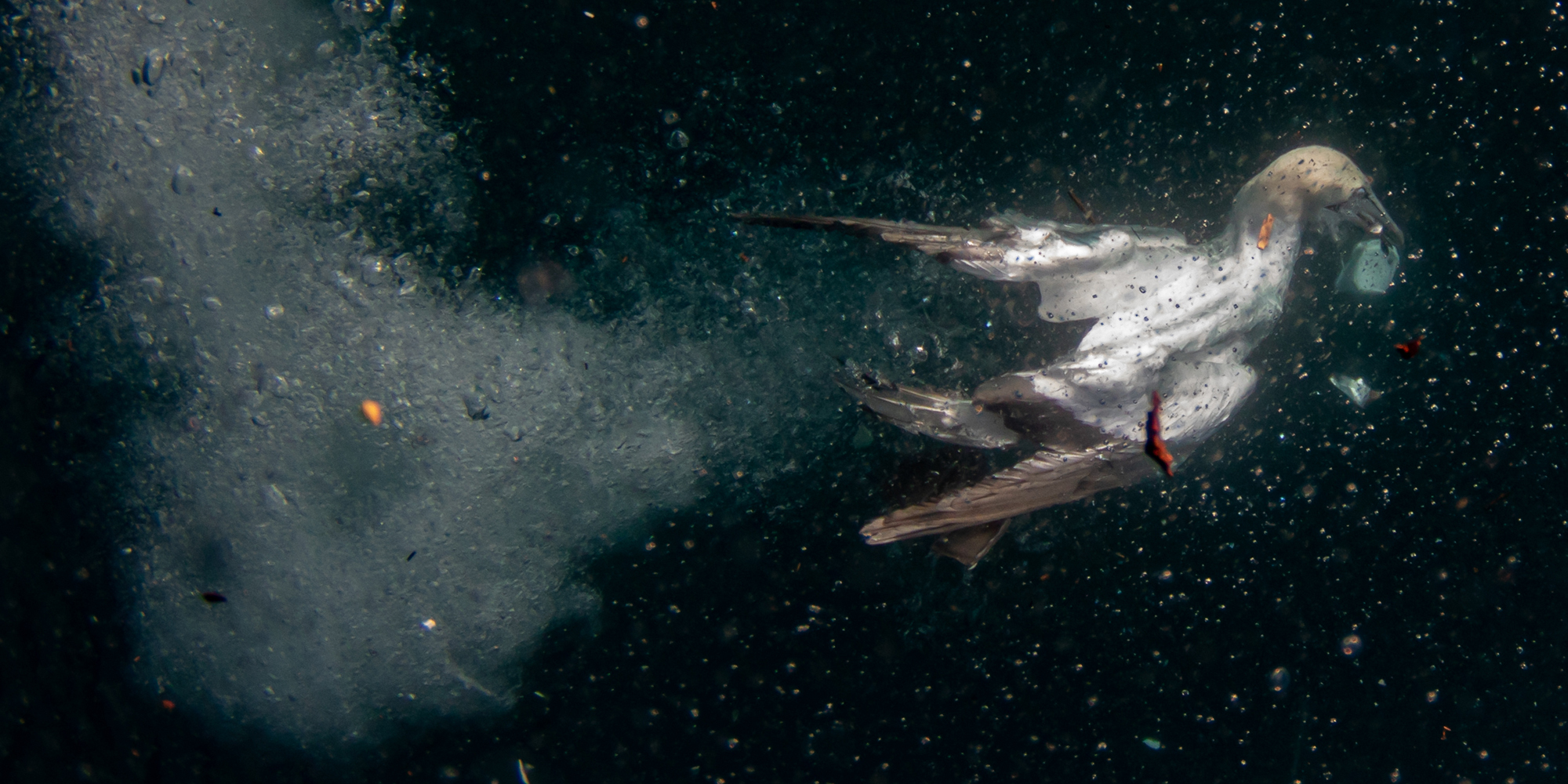 World-renowned open-water swimmer and founder of Breathe Ocean Conservation, Sarah Ferguson, described the experience as ‘like being in a giant petri dish surrounded by a swill of slow-motion amoebas, only it was bottles and bits of bag, and rope and packaging’. (Photo: Linda Ness / View more: @linda.ness.pix)
World-renowned open-water swimmer and founder of Breathe Ocean Conservation, Sarah Ferguson, described the experience as ‘like being in a giant petri dish surrounded by a swill of slow-motion amoebas, only it was bottles and bits of bag, and rope and packaging’. (Photo: Linda Ness / View more: @linda.ness.pix)